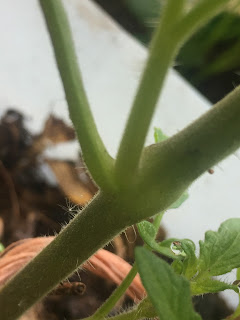The Summer Tomato Project
 What is in it for me?
What is in it for me?When we thought about this project, one of the most interesting parts was seeking how to integrate the things that the kids wanted to learn about into the garden. The work became making their interests relevant to garden and vice versa. This became their summer project and the things they are working on are the things they want to work on. They are not getting a grade and they are not obligated to participate. 100 3rd graders in the south and the Pacific Northwest participated in this project over the school year and 15 are going to continue working on it over the summer, because they want to.
We started working on this project nearly a year ago with the compost pile. This was our opportunity to jump into the Cycle. Our students followed the garden throughout it's phases and looked into everything that can come from it.
The problem is that during a normal school year, this time of year can bring a learning garden to a screeching halt. Many school gardens flounder this time of year because school is out and there is no one to take care of them.
Also, this can be one of the most interesting times of the year. All times of year are interesting in the garden, but this one in particular because there are so many things going on. It is the time of year when things are active above ground and, with the onset of fruits and vegetables, there is a "payoff" to all the hard work. Flowers become fruits and vegetables; vegetables ripen and so on.
The trick and the basis of neopermaculture is sustainability. We worked on how to keep the garden going and growing. We had to ask out students what would they like to do over the summer. The garden is primarily the platform, the jumping off point to other points and interests. So we asked the kids, in order to keep them interested over the summer to think about "What is in it for them?"
Out of 100 students, we found that only 15 of them were going to be able to participate in the project over the summer. 2 of those 15 are in Seattle and the other 13 are in the Atlanta area. The other 85 listed many reasons for not being able to participate over the summer but the focal points were some very simple fixes that we are going to work on for next year. A small number (7) were not interested.
The overwhelming issue that was preventing kids from participating was not the lack of desire, it was lack of simple resources; not the least of which was lack of routine access to wi-fi.
The students who remained are tasked with keeping up with the garden and engaging in solving those problems. We started asking them questions about what they were interested in, not so much "what do you want to be when you grow up." Their responses tended towards technology and what happens to the food being produced. They have proven themselves to be future minded and engaged in social/ civic justice. (earlier this year, they voted to donate $150.00 of the money they earned to school lunch programs).

This summer, these students are going to help keep this garden going. They are going help us further
define the communications links and increase the garden accessibility and work on some of these issues.
We predict that there are forces at work now that will make food production in the next five years and beyond a lot different from what we see at the moment. What will our food systems look like in 15 years? ...In 30 years? These are very interesting questions that the big kids cannot answer, but that our 3rd graders can.
In the meantime, we are going to look at what THEY are interested. Art in the garden, technology in the garden, and helping more people get involved projects like this.
If you would like to help out or be a part of this, you an contribute or link below...
To contact us, send us an email at thelifecooperative@gmail.com
Follow us on twitter at thelifecoop


Comments
Post a Comment